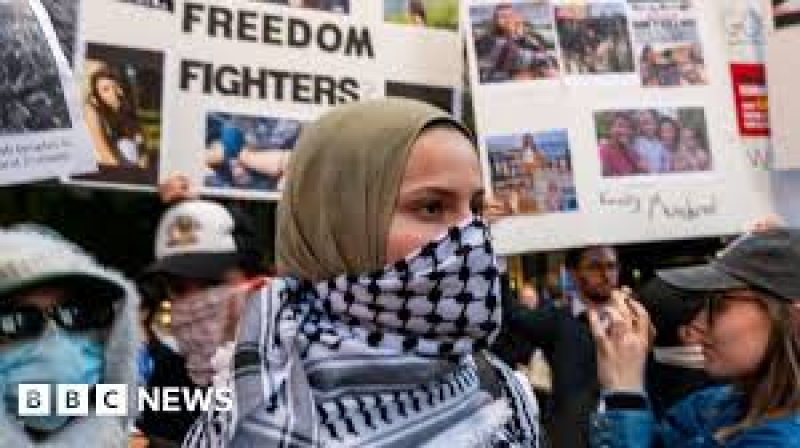- Muslim League leads new electoral alliance, Jatiya Muslim Jote |
- Tk 500cr Drive to Turn Haor Fallow Land Into Farmland |
- Tarique Rahman returns home amid rapturous reception |
- Home After 17 Years: Tarique Returns to Gulshan Residence |
- Tarique Calls for United Effort to Build a Safe Bangladesh |
Israel-Gaza inflames tensions on Us college campuses

A debate over the war between Israel and Hamas is raging on US college campuses. In a social media age that demands people pick a side on divisive issues, is there still space for young Americans to talk to each other?
Hundreds of students gathered on the main quad at Columbia University in New York City last week to engage in duelling protests in support of Israel and the Palestinian people - and to condemn the loss of life.
Pro-Israel protesters, most of whom were Jewish, draped themselves in white and blue Israeli flags. For much of the event, they remained silent, letting signs with photos of the victims of Hamas' deadly attack speak for them.
Across the square, students who supported the Palestinians waved signs declaring "Free Palestine" and "End the Occupation". A female student from Gaza spoke of her mother, trapped by an Israeli blockade.
Though the two sides stood just yards apart, the ideological distance between them seemed insurmountably wide, and only grew more pronounced as the evening progressed.
One of the leaders of the pro-Palestinian demonstration read aloud an open letter published by two student groups at Columbia just a day after Hamas militants rampaged through a music festival and several Israeli towns, killing at least 1,400 people and taking about 150 hostages.
The attack was a "historic moment for the Palestinians of Gaza, who tore through the wall that has been suffocating them in one of the most densely populated areas on Earth".
"Despite the odds against them," the speaker continued to read, "Palestinians launched a counter-offensive against their settler-colonial oppressor."
To these students, the attack on Israel was an important development in the decades-long fight for Palestinian autonomy. And Israel's response in the days since was another example of its indifference to the suffering of the Palestinian people.
More than 2,700 Palestinians in Gaza have died during retaliatory Israeli air strikes, while just over two million people there are trapped by a blockade and cut off from power and clean water.
Israeli officials have used extreme language, with Defence Minister Yoan Gallant referring to Hamas militants as "human animals". And the death toll will rise if Israel launches an expected ground offensive.
Most of the activists at Thursday's rally would not speak to reporters. But Darializa Avila Chevilier, who graduated from Columbia in 2016 and had come to support the pro-Palestinian protesters, told the BBC:
"No-one wants violence. What we are saying is the violence will end when there's justice, and people are living with dignity."
The speakers at the rally condemned the loss of all civilian life and held a moment of silence. But they did not make specific mention of the Israeli victims of violence, or the atrocities carried out by Hamas fighters against civilians, including many women and children.
The protest's organisers, Students for Justice in Palestine, told the BBC in a statement that they oppose any form of violence against innocent civilians and stand "only for the preservation of life and justice".
They went on to question "why an entire nationality—Palestinians—are being made to answer for the actions of [Hamas]".
Yet many of their Jewish classmates across the lawn heard something else in those speeches: a dismissal of murders perpetrated against their own religious and ethnic minority, which has also faced persecution.
"If you are justifying the murder of innocent civilians, you do not understand human rights," one of their posters declared.
Columbia University is not alone in reeling from this political divide.
Student groups at Harvard University issued a statement which blamed Israel's policies for the massacre of its civilians, which prompted a backlash from powerful alumni, reports BBC.

